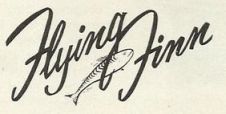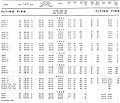Difference between revisions of "Flying Finn"
(added categories, boats in use link) |
(added logo, history, fixed boats in use link) |
||
| Line 1: | Line 1: | ||
| − | + | [[File:Flyingfinnlogo59.jpg]] | |
| + | |||
| + | |||
| + | Additional History Needed. Please contact us to edit or contribute to this page. | ||
| Line 7: | Line 10: | ||
New York, New York | New York, New York | ||
| + | |||
| + | |||
| + | Flying Finn, Inc. - A Brief History, by Robert George: | ||
| + | |||
| + | |||
| + | My father Robert J. George and his friend Bill Kano decided sometime in the early 1950's to start importing wooden pleasure boats from Finland. Bill Kano had already been in the import/export business and thought they could profit from selling the standard Finnish built boat in the U.S. The history of boat building in Finland was legendary, going back to the Vikings. The wood used was a Finnish Pine, which was a harder, more resilient pine with lower sap content than the typical American Pine, ideal for boat construction. | ||
| + | |||
| + | |||
| + | The first boat to arrive in the U.S. was a well-made, hand-crafted, sea-worthy boat that lacked the American styling and was only designed for outboard motors up to about 7 1/2 horsepower. They decided that they liked the craftsmanship, but would need to start their own company and have boats built to their design and specifications in Finland. Their partnership founded: | ||
| + | |||
| + | Finnish Yachts and Boats, Inc. | ||
| + | 122 East 42nd Street; New York, N.Y. | ||
| + | |||
| + | |||
| + | Their first order of business was to come up with a marketable boat that retained the Finnish style and craftsmanship. They retained Charles W. Witholz - Naval Architect to design their initial offering of boats. Called out as ''Witholz is one of America's most versatile naval architects'' in an ''A Unit of Water, A Unit of Time'' by Douglas Whynott. Charles with input from the company designed four boats (''Seafin 18, Bayfin 17, Gulfin 15, and Elfin 14''). The hull sizes were created for shipping economy (''the 14' fit in the 15', which fit in the 17', and together they all fit in the 18' hull''). The foredecks, seating, and windshield kits were shipped unassembled for fitting in the U.S. Shipping cost was figured by cubic feet taken in the freighter's hold, therefore it was the same cost as shipping one 18' boat. Deck hardware and other accessories were assembled in the U.S. before distribution to their boat dealers. | ||
| + | |||
| + | |||
| + | The name change to Flying Finn came before going to market in 1956: | ||
| + | |||
| + | |||
| + | Flying Finn, Inc. | ||
| + | 527 Lexington Ave; New York, N.Y. | ||
| + | Six (6) years in business from 1956 to 1962 | ||
| + | |||
| + | |||
| + | "Flying Finn" was the nickname for Paavo Nurmi, a long distance runner who won three gold medals in the 1920 Summer Olympics and five gold medals in the 1924 Olympics in Paris. The boat named for their national hero greatly interested the boat builders in Finland and production was underway. | ||
| + | |||
| + | |||
| + | The company grew rapidly and after the 1956 NYC Boat Show they had numerous requests for a larger hull design. They contacted Charles Witholz to design the Seafin 21 to be included in the 1957 line of boats. The Seafin 21 was a big hit and after the boat was used in the 1958 U.S. Atlantic Tuna Tournament it was featured in Field & Stream's February 1959 issue. | ||
| + | |||
| + | |||
| + | |||
| Line 21: | Line 56: | ||
| − | [http://www.fiberglassics.com/ | + | [http://www.fiberglassics.com/index.php?searchword=Flying+Finn&ordering=newest&searchphrase=exact&Itemid=88&option=com_search Flying Finn Boats in Use] |
Revision as of 18:04, 21 July 2013
Additional History Needed. Please contact us to edit or contribute to this page.
Flying Finn, Inc.
527 Lexington Ave.
New York, New York
Flying Finn, Inc. - A Brief History, by Robert George:
My father Robert J. George and his friend Bill Kano decided sometime in the early 1950's to start importing wooden pleasure boats from Finland. Bill Kano had already been in the import/export business and thought they could profit from selling the standard Finnish built boat in the U.S. The history of boat building in Finland was legendary, going back to the Vikings. The wood used was a Finnish Pine, which was a harder, more resilient pine with lower sap content than the typical American Pine, ideal for boat construction.
The first boat to arrive in the U.S. was a well-made, hand-crafted, sea-worthy boat that lacked the American styling and was only designed for outboard motors up to about 7 1/2 horsepower. They decided that they liked the craftsmanship, but would need to start their own company and have boats built to their design and specifications in Finland. Their partnership founded:
Finnish Yachts and Boats, Inc. 122 East 42nd Street; New York, N.Y.
Their first order of business was to come up with a marketable boat that retained the Finnish style and craftsmanship. They retained Charles W. Witholz - Naval Architect to design their initial offering of boats. Called out as Witholz is one of America's most versatile naval architects in an A Unit of Water, A Unit of Time by Douglas Whynott. Charles with input from the company designed four boats (Seafin 18, Bayfin 17, Gulfin 15, and Elfin 14). The hull sizes were created for shipping economy (the 14' fit in the 15', which fit in the 17', and together they all fit in the 18' hull). The foredecks, seating, and windshield kits were shipped unassembled for fitting in the U.S. Shipping cost was figured by cubic feet taken in the freighter's hold, therefore it was the same cost as shipping one 18' boat. Deck hardware and other accessories were assembled in the U.S. before distribution to their boat dealers.
The name change to Flying Finn came before going to market in 1956:
Flying Finn, Inc.
527 Lexington Ave; New York, N.Y.
Six (6) years in business from 1956 to 1962
"Flying Finn" was the nickname for Paavo Nurmi, a long distance runner who won three gold medals in the 1920 Summer Olympics and five gold medals in the 1924 Olympics in Paris. The boat named for their national hero greatly interested the boat builders in Finland and production was underway.
The company grew rapidly and after the 1956 NYC Boat Show they had numerous requests for a larger hull design. They contacted Charles Witholz to design the Seafin 21 to be included in the 1957 line of boats. The Seafin 21 was a big hit and after the boat was used in the 1958 U.S. Atlantic Tuna Tournament it was featured in Field & Stream's February 1959 issue.
Model Information
1959 Information

